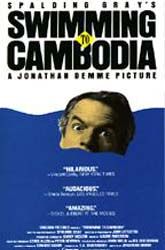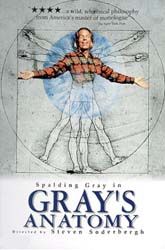| Cinema-Scene.com > Volume 3 > Number 13 |
Cinema-Scene.com
Volume 3, Number 13
This Week's Reviews: Spy Kids.
This Week's Omissions: Ratcatcher, Spring Forward, Tomcats.
Video Reviews: Swimming to Cambodia, Monster in a Box, Gray's Anatomy.
Carmen (Vega) and Juni (Sabara) seem like normal siblings living in their Mexican suburb. She, the acerbic realist, and he, the neaurotic dreamer (think Woody Allen in a 3-foot body of The Spin Room's Tucker Carlson), go through the normal growing pains that come to any youths -- the dread of school, the bullies, the inherently geeky parents.
But Carmen and Juni do not really know everything about their mom and dad. Years ago, Gregorio (Banderas) and Ingrid (Gugino) Cortez were sent to kill each other -- they were secret agents working for opposing sides -- and they fell in love. When their respective employers gave a surprise appearance at their wedding, Gregorio and Ingrid decide to end their lives as spies and raise a family. Now, they merely work as spy advisors for the O.S.S., where they can still keep in touch with old coworkers and can remain sure that their family is secure in the event that someone might someday go after their family.
Turns out that there really is nothing to worry about for the Cortez family -- mom and dad seem to have created a nice, non-hostile environment for Carmen and Juni that has kept them out of harm's way. But the call of the job hits and Gregorio decides that he and Ingrid need to get back in the game for one mission after the recommendation of old friend Gradenko (Hatcher). It seems that a crazed Saturday morning TV show host named Fegan Floop (Cummings) has abducted former O.S.S. scientists and changed them into colorful, abnormally headed characters for his show. Each scientist worked on a tiny brain that could be used for artificial intelligence and Floop thinks he can use this brain in the heads of his cyborg children, who look exactly like the kids of various world leaders (is it just me, or does this seem a whole lot like a storyline to a 1968 Batman episode, perhaps with Frank Gorshin as Floop?) and have a personal army in high profile places.
En route to Floop's seaside mansion, Gregorio and Ingrid are captured and taken into his madcap home. Meanwhile, Carmen and Juni come near being captured as well by Floop's henchmen (who, as it happens, are robots with thumbs for all their appendages), but escape to a hideout while their "uncle" (Marin) informs them of their parent's real occupation. It is up to Carmen and Juni to save their parents -- some of the people that they think they can trust are really playing for Floop. Clad in leather and holding weapons that look like rejects from their toy shelves, the two set out to get their parents out of harm's way and, perhaps, deal with their own personal problems along the way.
Of the four features films that Robert Rodriguez has made before now, I count only one that I liked. A single one, and it was more or less critically reviled. That film was Desperado, the action-extravaganza that Rodriguez made as an Americanized version of his first film El Mariachi, and it was hated. In fact, the only one that was not hated by critics was El Mariachi, and guess what, I hated it. So, looking back at El Mariachi, From Dusk Till Dawn, The Faculty, and his one-fourth of Four Rooms, I could only fear what would come with Rodriguez going with family friendly fare. At least, Spielberg had great films like Jaws and The Sugarland Express to show his directing ability before taking on the more family-oriented E.T.: The Extra-Terrestrial.
But, Rodriguez pulls it off, I don't really know how he did it, but he pulls it off. Going from films filled with contemptible characters and blood-on-tap, Rodriguez should not be able to do something as accessible as Spy Kids. As is the case with any good family film, Spy Kids is not only open to kids, but also has a toned down Rodriguez edge that makes it enjoyable for adults.
As you watch this film, you really feel in the moment. This is one of those adventure films in which you really wish that you could join in. The colorful places and imaginative accessories are so off-the-wall that they do not scare the children while still retaining the fun aspect for the adults. I have seen many kids adventure films over the years, and Spy Kids is one of the few that really made the moment, well, momentous. It is adventure movies like this that kids should see, not messes like See Spot Run and Home Alone.
Unlike most of those films, Spy Kids does not paint all the adults as imbeciles in need of either guidance or punishment by the youths -- each adult in this film, like in real life, has merits and debits. Spy Kids does not for once attempt to paint the entire elder age group as dimwits that haven't a clue as to what they are doing. Even the Cummings character, who acts awfully like Willy Wonka, is beyond complete fault -- in fact, he is actually one character that literally pops off the screen and into the collective pleasure of all those watching.
While I would not call the film tantamount in the realm of
film history, I am heartened by it. Spy Kids does not dumb itself down for
children. Even when it is at its most cartoonish moment, the film remains endearing for
everyone involved, never condescending.

| BUY THIS FILM'S FROM AMAZON.COM |
REVIEWS OF THIS FILM |
Video Reviews: With only one film to review this week, I thought I'd turn to a long finished piece on the three Spalding Gray monologues. Think of it as some sort of salute to Steven Soderbergh winner Best Director I suppose.
 |
 |
 |
Swimming to Cambodia Monster in a Box Gray's Anatomy (Dir: Jonathan Demme, Appearance by Spalding Gray) BY: DAVID PERRY |
Spalding Gray is one of those people that will start up a conversation and would not care if you never uttered a word. He has a gift for the gab; glibness is a way of life. So it was only understandable that he has become famous for sitting there and talking. His approach to speaking has the dynamics of a fine Shakespearean actor and that speech, most certainly, is never ending.
In the 1970’s, Gray began doing monologues for audiences in New York with Sex and Death to the Age of 14, his autobiographical look at his first fourteen years in Rhode Island. He soon became a huge underground hit and worked his way into getting roles in various movies. It was the 1984 Roland Joffé film The Killing Fields that finally brought his dialogues to the screen. The production of that film in Cambodia and the various things he learned about himself afterwards made for an interesting new monologue called Swimming to Cambodia.
This monologue interested then-budding director Jonathan Demme. The young independent director was fresh off of Stop Making Sense, a filming of the Talking Heads concert tour, arguably the finest concert film ever made. Demme knew that it would be taxing to convince an audience that it would be interesting to watch a man talk for a couple hours, so he cut down the length (Cambodia lasts an hour and a half, two and half hours short of its initial length) and added a great deal of cinematic touches including small sound effect, dramatic music, and subtle light changes adding onto the previous set directions that had already been done on stage.
So here was this little neurotic man sitting at a desk, a glass of water and a microphone at hand with a couple maps and a cloud background behind. The question was whether he could make his performance work on film as well as it did live. And he did. Swimming to Cambodia was a huge arthouse hit, catapulting Gray into a type of fame that few actors know. Everyone who saw him in Swimming to Cambodia knew him, not some character. Gray was like an old friend -- just that edgy, Woody Allen-like old friend.
Demme was an artist of fine approach in those days -- his Melvin and Howard screams young director while still being a fine film, like Sydney Pollock’s They Shoot Horses, Don’t They? and Joel Coen’s Blood Simple. He had honed some of his style before he made this,which is a welcomed fact -- think of how boring this film might have been if placed in the hand of some hack director.
After the success of Swimming to Cambodia, Gray decided to write a semi-autobiographical novel -- a huge brick made out of manuscript paper. In his next monologue, Monster in a Box, Gray looked at his experiences writing this huge novel that he throws onto his desk in a box. Now a somewhat recognizable face, Gray can tell about his dealings with agents, fans, publicists, and publishers. He has movie deals coming on his doorstep and money coming into a once empty bank account. For him, the struggle of the poor unknown actor has been saved by a monologue movie and he has survived to tell all about it in another monologue.
Though the story given is more interesting, the direction is not half of what Demme brought to Swimming to Cambodia. The new director, Nick Broomfield, was a relative pro at making documentaries at the BBC, where he always gave fine pieces, but his only work in dialogue was in a show called Lily Tomlin with the actress and two of her friends. He has since proven himself with BBC docs Heidi Fleiss: Hollywood Madam, Fetishes, and Kurt & Courtney. Broomfield gives the work too much of an insidious feel. His work looks like he is attempting to do the same work as Demme on the first film, with some little touches that fail.
Laurie Anderson returns to do the occasional background music, and she does some credible work here given the confines of the director. I do have a great deal of respect for this work because nearly everyone on hand wanted to do another great one like Swimming to Cambodia even though they had too much to look up to.
When Monster in a Box came out to respectable if disappointing reviews, it was imagined that it was the end of Spalding Gray monologues on celluloid, but that was not to be true. Five years later, he returned in a new monologue, Gray’s Anatomy, produced by the Independent Film Channel. This time around, Gray remembers his scurrying around world medicine to find a way to get rid of his eye infection (called a 'macula pucker').
Director Steven Soderbergh takes on the story with a style most certainly his own. Starting off the story with people remembering their own eye problems, Soderbergh attempts to give us a feel that everyone is common by their eyes. It may sound like a foolish idea, but you do seem to get the point from this -- perhaps we are all brought to together through out eyes. Most everyone I know has had an ocular problem in their life.
Spalding Gray’s problem involved surgery. Much worse, the surgery happens to be called 'macula scraping.' Macula scraping! Could there be a more frightening name for a surgery?
Hoping to steer clear of any scraping occurring in his eye, Gray decides to find an alternative, anything that might possibly keep him from a process that sounds like something from A Clockwork Orange. He goes to the Philippines for a psychic surgeon; he meets three Hasidim, who think he’s homeless; he goes to his Christian Scientist fellowship to be chastened for going to medical doctors. Before long he has done yard work in New Jersey and feared for his life at an Indian reservation.
The score by semi-regular Soderbergh collaborator Cliff Martinez (he has worked on all Soderbergh films besides Out of Sight, Schizopolis, and Erin Brockovich) is a welcomed advance from the earlier Laura Anderson scores. He works in a moody score with the flash of Soderbergh and editor Susan Littenberg.
Gray’s Anatomy, in my mind, is the finest of the three films. It is funny, incisive, and captivating. Soderbergh is in top form and makes for a very entertaining and mesmerizing eighty minutes. Soderbergh has been working up from the anti-Hollywood beliefs that he worked with back then after the lackluster success of his studio films Kafka and King of the Hill. He is now back to being a little commercial while never losing his artisitic beliefs. I thank Schizopolis and this Gray's Anatomy for helping get the isolationist feelings out of his system. It is nice to see that in 2000, with Traffic and Erin Brockovich, he has finally been accepted by everyone, critics and audiences alike.
But the underlying fact to the success of Gray’s
Anatomy, as well as all the other films regardless of director, is basically in the
work of Spalding Gray. He is the reason that these films are interesting when all we see
is him -- this is certainly all his work, just artistically brought to theatre screens.
Who knew that being verbose could be so damn intriguing?
Swimming to Cambodia:

| BUY THIS FILM'S FROM AMAZON.COM |
REVIEWS OF THIS FILM |
Monster in a Box:

| BUY THIS FILM'S FROM AMAZON.COM |
REVIEWS OF THIS FILM |
Gray's Anatomy:

| BUY THIS FILM'S FROM AMAZON.COM |
REVIEWS OF THIS FILM |
Reviews by:
David Perry
©2001, Cinema-Scene.com
http://www.cinema-scene.com